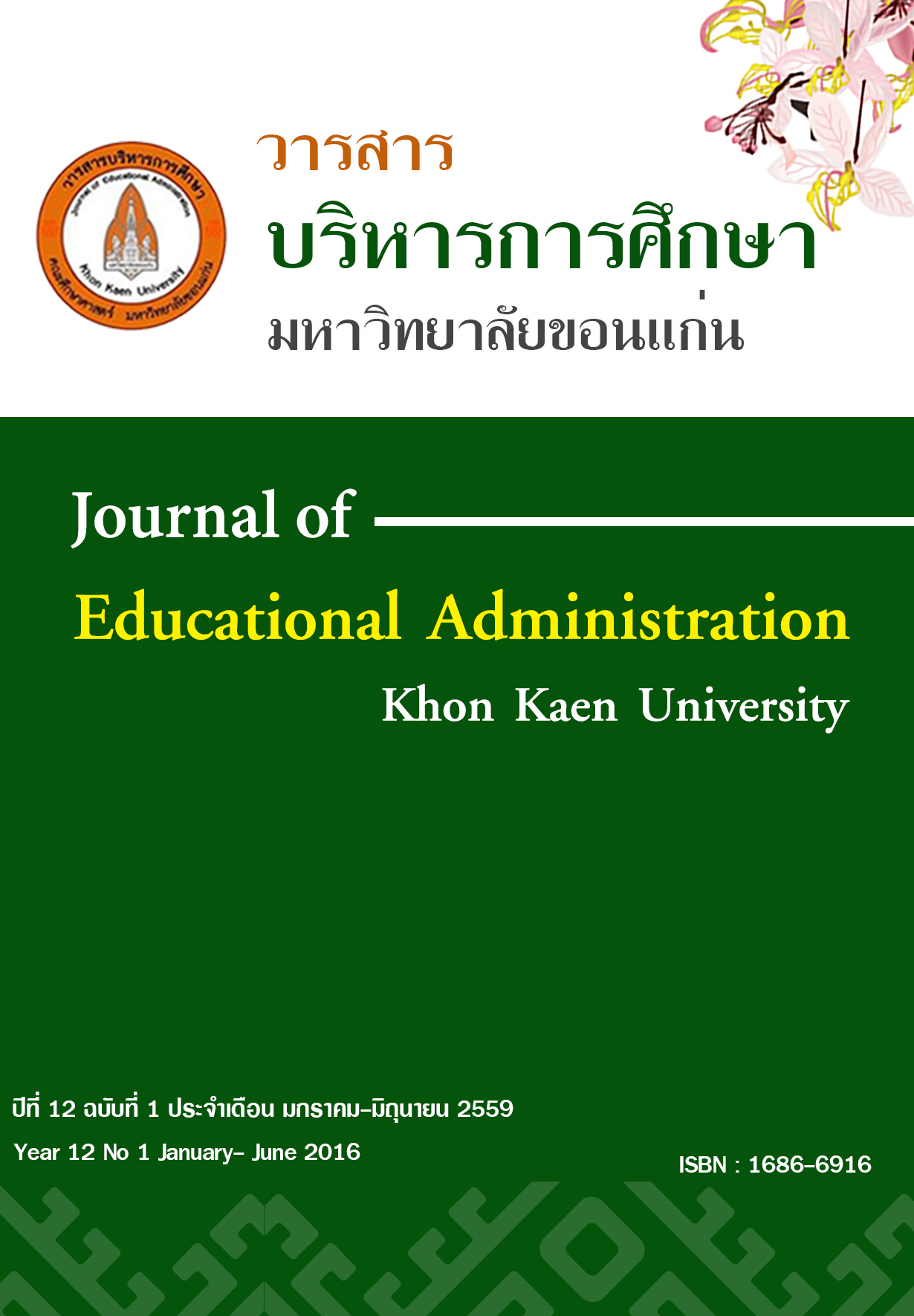นวัตกรรมชุมชนเพื่อการเรียนรู้ตลอดชีวิต Community Innovation for Lifelong Learning
Main Article Content
บทคัดย่อ
การวิจัยครั้งนี้มีจุดประสงค์เพื่อศึกษาสถานการณ์ด้านการศึกษา ทักษะการทำงาน การดำเนินชีวิต ของคนในชุมชนทั้งในอดีตและปัจจุบัน เพื่อให้ทราบถึงปัญหาความต้องการของคนในชุมชน นำมาสู่การสร้างกระบวนการการเรียนรู้ใหม่ให้เกิดขึ้นในชุมชน เพื่อเป็นภูมิคุ้มกันให้ชุมชนเกิดความเข้มแข็ง เกิดความตระหนักในการเรียนรู้ ยอมรับการเรียนรู้ใหม่ จนเกิดการเปลี่ยนแปลงพฤติกรรม เกิดทักษะการเรียนรู้ ทักษะการทำงาน ทักษะการดำเนินชีวิต ดังนั้นการเรียนรู้ไม่ควรจำกัดอยู่เพียงแค่ในระบบเท่านั้น การเรียนรู้ตลอดชีวิตจึงเป็นเป้าหมายที่ควรได้รับการส่งเสริม กลุ่มเป้าหมาย คือ กลุ่มคนสามวัย กลุ่มวัยเด็กและเยาวชน วัยผู้ใช้แรงงาน และวัยผู้สูงอายุ บ้านโพนเมือง ตำบลโพนเมือง อำเภออาจสามารถ จังหวัดร้อยเอ็ด จำนวน 30 คน โดยใช้วิธีการคัดเลือกกลุ่มเป้าหมายแบบเจาะจง ใช้ระเบียบการวิจัยแบบผสานวิธี คือ ใช้การวิจัยเชิงคุณภาพเป็นหลัก ใช้การวิจัยเชิงปริมาณเป็นรอง และประยุกต์ใช้วิธีวิทยา (Methodology) ของงานวิจัยเพื่อท้องถิ่น (Community Based Research) ของสำนักงานกองทุนสนับสนุนการวิจัย (สกว.) เครื่องมือที่ใช้ในการเก็บรวบรวมข้อมูล ได้แก่ การสำรวจชุมชน การเปิดเวทีชาวบ้าน กาสนทนา การสนทนากลุ่มย่อย ศึกษาประวัติศาสตร์ชุมชน แผนที่ภูมิสังคม เสวนาทางวิชาการ การสัมภาษณ์ การวิเคราะห์ข้อมูลโดยการวิเคราะห์เนื้อหา จากผลการศึกษาพบว่า 1.การพัฒนานวัตกรรมที่เหมาะสมกับชุมชน เพื่อให้เกิดกระบวนการเรียนรู้ใหม่ โดยคนสามวัยสามารถที่จะร่วมกิจกรรมในนวัตกรรมชุมชนได้อย่างไม่แบ่งแยก เรียนรู้ร่วมกันเกิดทักษะในการดำเนินชีวิต นำหลักปรัชญาเศรษฐกิจพอเพียงมาประยุกต์ใช้ให้ 2. การพัฒนาทักษะกระบวนการเรียนรู้ของคนสามวัยให้เกิดการเรียนรู้ร่วมกัน ต้องมีการกำหนดแนวทางการพัฒนาชุมชนท้องถิ่นบนหลักการพึ่งพาตนเอง ปรับวิธีคิด นำมาปฏิบัติและพัฒนาต่อยอดจากหลากหลายความคิดร่วมกัน และ 3. คนในชุมชนมีพฤติกรรมเปลี่ยนแปลงทุกด้าน โดยเรียนรู้ได้ด้วยเชิงประจักษ์ในพฤติกรรมผ่านกิจกรรมหลักในการเรียนรู้ร่วมกันใน 3 ช่องทางคือ 1) เรียนรู้ร่วมกันในชุมชน 2) การนำชุมชนไปเรียนรู้ร่วมกับชุมชนอื่น และ 3) ชุมชนพื้นที่อื่นมาเรียนรู้ร่วมกับนวัตกรรมชุมชนเพื่อการเรียนรู้ตลอดชีวิตของเศรษฐกิจพอเพียงมาประยุกต์ใช้ได้อย่างเหมาะสม ตระหนักและเห็นคุณค่าของการเรียนรู้ ซึ่งต้องต่อเนื่องตลอดชีวิต
This research aimed to study educational situations, working skills, and livelihood of people in the community from past and present in order to understand problems and needs. It led to the creation of new learning processes and reinforced the community to be strong, aware of learning, and open to new learning, which influenced the change of behaviors and the creation of working and living skills. Learning should not be limited only to the education system, but lifelong learning is a goal that should also be supported. Target samples were 3 groups of different ages consisting of children and youth, working-age people, and the elderly who were from Ban Phon Mueang, Tambon Phon Mueang, Amphoe At Samat, Roi Et. The 30 people selected by means of a specific target group. The study used mixed methodology which majorly focused on the qualitative data and the quantitative data subsequently. Community-based research of The Thailand Research Fund was also applied to the study. Data collection instruments included community survey, local forum, focus group, small group discussion, study of community history and social map, academic conference, and interview. Content analysis was used to analyze collected data. The study found 1. The development of the innovation community. To achieve new learning process. The three young people were able to participate in the innovation community, not divide. Collaborative learning skills in everyday life. Remove core philosophy applied to. 2.The acquisition process of the third age learning to learn together. Guidelines need to be developed on the principle of self-reliance of local communities that fit their ideas put into practice and the implementation of various ideas together. The acquisition process of the third age learning to learn together. Guidelines need to be developed on the principle of self-reliance of local communities that fit their ideas put into practice and the implementation of various ideas together. And 3. Other area communities come together with innovative learning community for lifelong learning, economic sufficiency applied appropriately. Recognize and appreciate the value of learning. Which must be continued throughout life

